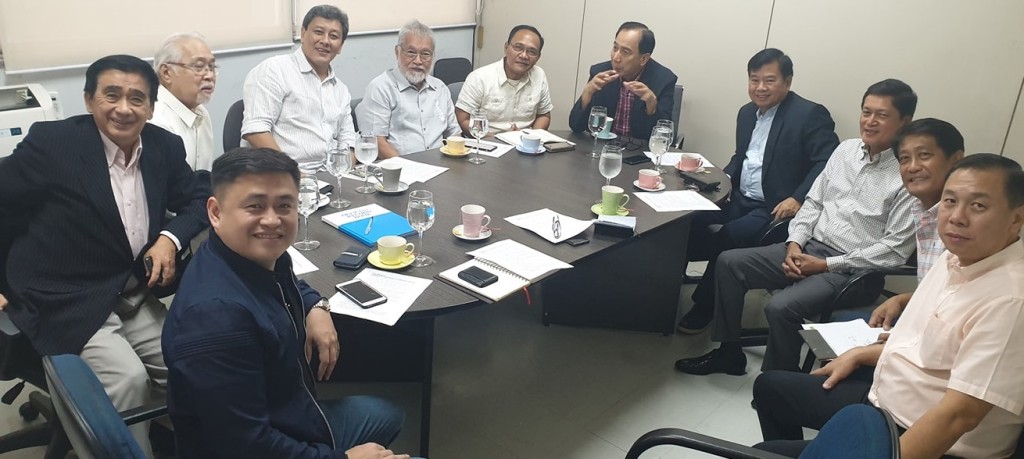
Courtesy Call to DA Sec. William Dar


August 26, 2019
The private sector has pressed government to address import irregularities, especially of Customs Bonded Warehouse (CBW), that allows dumping of cheap poultry imports adversely affecting small producers as imports peaked to a record 310 million kilos (2018).
The United Broilers and Raisers Assn (UBRA) has asked newly-appointed Department of Agriculture (DA) Secretary William D. Dar to put in place system to systematically monitor imports, particularly that of CBW.
UBRA leaders, , together with Philippine Chamber of Agriculture and Food Inc (PCAFI) President Danilo V. Fausto, just met with Dar regarding reform recommendations in specific farm sectors.
The poultry raisers are asking DA to keep a data monitoring of CBW chicken imports.
“(In the past), DA has shown no institutional commitment to address unfair trade and smuggling. They can’t even present data on customs bonded importation,” said UBRA President Bong Inciong.
“It is so obvious that there’s irresponsibility on the part of the government. When you say customs bonded warehouse, you’re supposed to (use imports for manufacturing input)and re-export, but DA has no data showing what is being re- exported.”

Although 30% of these CBW imports are allowed to be distributed to local markets (supermarkets, wet markets), such volume has to be paid with tariffs.
“But there’s no record showing they pay tariffs. Here is where we find it hard to look up to government.
They have a mandate to develop local industries. How can you develop your industry if you don’t have data, how can you manage?” said Inciong. “They keep talking about competitiveness about addressing unfair trade, smuggling when they don’t even bother to organize data.”
Fausto said the poultry industry is a top priority in the agriculture sector as it is the sector generating the third highest revenue, following only rice and pork.
Philippine Statistics Authority (PSA) data showed gross value of poultry production as of the first quarter of 2019 was at P55.4 billion.
Inciong said there is a globally recognized system to monitor technical smuggling—that is comparing local import data compared to imports being reported from country of origin. But DA is not even adopting this system.
This absence of CBW monitoring record applies too with the Bureau of Animal Industry (BAI) and National Meat Inspection System (NMIS), UBRA said.
The poultry raisers are also raising the following problems with Dar:
“Government has the fondness for justifying imports. This is the opportunity that has high gov ernment support. Last year, inflation was high, they all panicked and removed safeguards for chicken. So in September 2018, we were (selling chicken at) below cost all the time. Our cost would be higher than the few years ago,” said Inciong.
“In July farmgate price was at (a very low) P81 per kilo. But market price was still high at P170. In July, farmgate price increased to P106 per kilo, and the retail price for consumers is still the same, at P170. Our position is imports do not benefit consumers. That’s true for rice, corn, chicken, and other agri products.”
In the past, there was an instance BOI gave incentives on the assumption there is a huge demand-supply gap for MDM mechanically deboned meat (MDM). This assumed this poultry classification renders the product useful for preparing chicken in the usual way (tinola, frying, turbo, etc). But MDM is really used as extenders in siomai or other processed meat.
“BOI invited the investor on the belief there’s massive shortage of chicken based on MDM data. But they just damaged the industry.”
Nevertheless, Inciong said Trade and Industry Secretary Ramon Lopez and DTI Undersecretary Ruth Castelo just met this month with UBRA regarding this concern of the sector.
PCAFI has also urged government to recognize huge trade subsidies being granted by other developed countries to their farmers, including poultry raisers, and similarly support Filipino farmers this way.
“Subsidies in one form or another have been the template for other countries with successful agricultural sectors. If we are to win the struggle for the future of agriculture, a more pragmatic approach as practiced by US and China should be the way forward,” said Fausto.
The United States Farm Bill as of 2018 placed farm support at $867 billion including huge trade support for making sure American farmers get a higher price for their produce even despite lower market prices.
Data monitoring of imports will be pivotal in helping raise small poultry raisers’ income amid global trade liberalization.
“The mindset of government is more imports, more local players will be forced to be competitive. But the government is the one that’s not competitive because it doesn’t provide the sector the amount of subsidy other governments provide their agri sector,” said Inciong. Chicken imports consistently rose from 135 million kilos in 2012, 141 million kilos, 2013; 177 million kilos, 2014; 198 million kilos, 2015; 232 million kilos, 2016; 244 million kilos, 2017; and 310 million kilos, 2018. (Melody M. Aguiba)